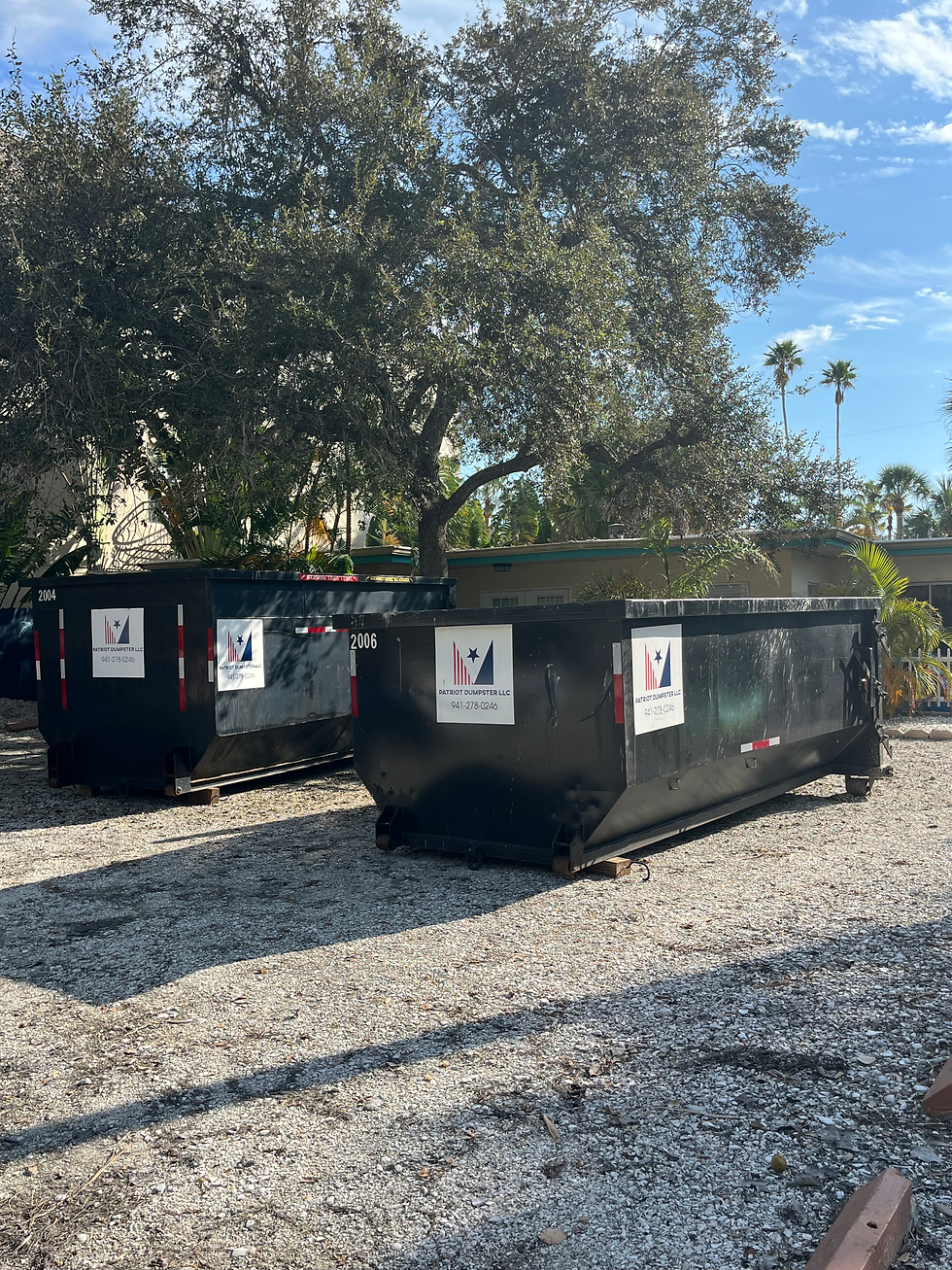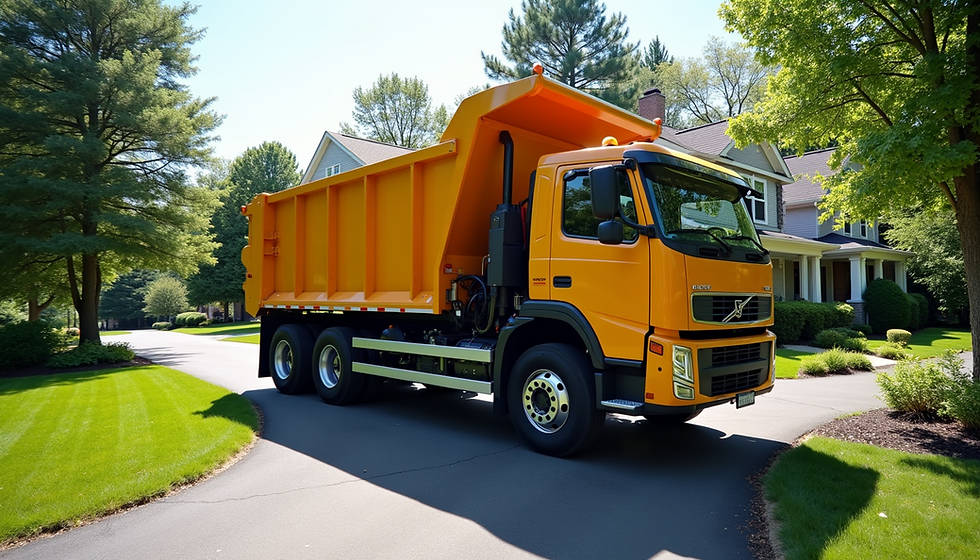The Impact of Proper Waste Segregation on Dumpster Rentals
- patriotdumsptersrq
- Apr 6, 2024
- 10 min read
Updated: Jul 13, 2025

Are you looking to declutter and organize your office space? In this informative article, we will explore the importance of office cleanouts and the steps to achieve an efficient cleanout process.
Discover the benefits of using a dumpster rental for office cleanouts, including convenience, cost-effectiveness, and proper disposal of hazardous materials.
We will also discuss the factors to consider when choosing a dumpster rental and how Patriot Dumpster SRQ can assist you with your office cleanout needs.
What Is an Office Cleanout?
Office cleanouts involve the systematic process of decluttering, organizing, and disposing of unwanted items in a workspace to create a cleaner and more efficient environment for business operations.
Maintaining a clean and organized office space is crucial for boosting productivity and enhancing employee well-being. A clutter-free environment can lead to reduced stress levels and increased focus among employees.
Office cleanouts help maximize space utilization, improving workflow efficiency, and enhancing the overall aesthetic appeal of the workspace. By promoting cleanliness and organization, businesses can create a positive and welcoming atmosphere that fosters creativity and collaboration.
Why Is an Office Cleanout Important?
An office cleanout is crucial for maintaining a conducive work environment that promotes productivity, efficiency, and employee morale.
A tidy workspace not only boosts employee morale but also reflects positively on the company's professionalism, creating a lasting impression on clients and visitors.
By investing in regular office cleaning and organization, businesses can ensure that their operations run smoothly without unnecessary clutter or distractions.
Employees are more likely to feel motivated and engaged in a clean and well-organized workspace, leading to improved focus and productivity throughout the workday.
What Are the Steps for an Efficient Office Cleanout?
Efficient office cleanouts involve a structured approach that includes:
Assessing the space
Creating a plan
Sorting items
Selecting appropriate disposal methods
Timely cleanouts ensure a clutter-free and organized workspace.
Once the assessment is completed, it's crucial to develop a detailed plan that outlines specific tasks and timelines for the cleanout process. Sorting items into categories such as items to keep, donate, recycle, or dispose of is a vital step in decluttering efficiently.
Properly disposing of junk through recycling centers or waste removal services is essential for maintaining a clean environment. Implementing efficient strategies for debris removal not only enhances productivity but also creates a pleasant and conducive workspace for employees.
Assess the Space
The initial step in an office cleanout is to assess the workspace thoroughly, identifying areas that require decluttering, clearing out unnecessary items, and determining the scope of the cleanup project.
To effectively evaluate the office space for a cleanout, start by examining each area methodically. Look for signs of clutter like stacks of paper, outdated equipment, or unused furniture. Consider the flow of the workspace and assess if there are any obstacles hindering productivity. Utilize labeling systems to categorize items into essential, non-essential, and items for donation or disposal. This will help in prioritizing what needs to be removed and what can stay, creating a streamlined and organized workspace.
Create a Plan
Developing a comprehensive plan for the office cleanout is essential to ensure an organized and efficient process. Establish a cleanup timeline, implement efficiency tips, and allocate resources effectively.
Begin by conducting a thorough assessment of your office space to determine the areas that require the most attention. Prioritize tasks based on urgency and impact, such as decluttering workstations, organizing filing systems, and purging obsolete documents.
Communicate the cleanup plan with all team members to enlist their support and participation. Utilize tools like labeling systems and storage bins to categorize items for easy sorting and disposal. Regularly review and adjust the cleanup timeline as needed to stay on track and meet deadlines for a successful office cleanout.
Sort and Organize Items
Sorting and organizing items during an office cleanout is crucial for creating an organized workspace, facilitating junk disposal, and maintaining workplace cleanliness for improved productivity.
Efficiently sorting and categorizing items reduces clutter and enhances the functionality of the workspace. Implementing a decluttering strategy, such as the 'Four Box Method' where items are classified into categories like keep, donate, recycle, or trash, can streamline the process. Utilizing storage solutions like shelves, bins, and drawer organizers can help maximize space and keep essentials within easy reach. Regularly purging unnecessary items and paper clutter can prevent the accumulation of junk, promoting a more productive and visually appealing office environment.
Decide on Disposal Methods
Selecting the appropriate disposal methods, such as dumpster rental or trash removal services, is essential for efficient waste management during an office cleanout. Opt for eco-friendly options whenever possible.
Dumpster rental services provide a convenient solution for businesses looking to handle large quantities of waste in a structured manner. By renting a dumpster, you can easily segregate different types of materials and ensure that recyclable items are separated from general waste. This not only promotes eco-friendly practices but also simplifies the junk removal process, saving time and effort.
Dumpster rental services often offer flexible scheduling options, allowing businesses to coordinate waste disposal according to their specific needs and timelines.
What Are the Benefits of Using a Dumpster Rental for Office Cleanouts?
Utilizing a dumpster rental for office cleanouts offers numerous advantages, including efficient cleanup, convenient junk hauling, and the opportunity to opt for eco-friendly waste disposal options.
Renting a dumpster streamlines the process of decluttering your workspace by providing a designated space to dispose of unwanted items quickly and effectively. By having a centralized location for all waste materials, you can ensure a more organized cleanout process while reducing the risk of clutter accumulating in various areas of your office. Opting for eco-friendly waste disposal options, such as recycling or donating usable items, not only helps the environment but also promotes a culture of sustainability within your workplace.
Convenience
Dumpster rental provides unmatched convenience during office cleanouts, offering easy access to dumpsters for rent, reliable cleanup services, and a hassle-free waste disposal process.
This service is ideal for organizations looking to declutter office spaces quickly and efficiently. By simply contacting a reputable dumpster rental company, businesses can have a suitable dumpster delivered right to their doorstep. The process is streamlined, with the service provider handling all aspects of waste removal, from drop-off to pick-up. This level of convenience not only saves time but also ensures that the cleanup is done in an environmentally responsible manner, meeting all waste disposal needs effectively.
Cost-Effectiveness
Opting for dumpster rental for office cleanouts is a cost-effective solution, as it eliminates the need for multiple trips to disposal sites, offers competitive dumpster pricing, and minimizes additional disposal fees.
By using a dumpster rental service, businesses can streamline their waste management process, saving valuable time and resources. The upfront pricing of dumpster rentals makes budgeting easier, as there are no hidden costs or unexpected fees. This cost-efficient cleanup solution not only helps maintain a clean and organized office space but also contributes to environmental sustainability by ensuring proper waste disposal practices. Choosing dumpster rental for office cleanouts is a practical and economical choice for companies looking to efficiently deal with their waste management needs.
Proper Disposal of Hazardous Materials
Dumpster rental ensures the proper disposal of hazardous materials during office cleanouts, complying with waste disposal regulations, and integrating essential safety measures for a secure cleanup process.
Proper hazardous waste disposal is crucial not only for maintaining a safe work environment but also for protecting human health and the environment. Adhering to waste disposal regulations helps prevent contamination of water, soil, and air.
Incorporating safety measures such as personal protective equipment and proper handling protocols is essential to minimize risks during waste cleanup processes. Efficient hazardous waste management practices also contribute to sustainability by reducing the impact of harmful substances on ecosystems and public health.
Time-Saving
Choosing dumpster rental for office cleanouts saves time, streamlines cleanup processes, enhances cleanup efficiency, and facilitates better coordination for a swift and effective cleanout operation.
By opting for a dumpster rental, individuals can significantly reduce the time spent on sorting and disposing of office clutter. This approach not only helps in decluttering the workspace promptly but also ensures a systematic and organized cleanup.
Implementing smart strategies such as categorizing items for disposal, recycling, or donation can further expedite the cleanup process. Coordinating pickup and drop-off times effectively with the rental company ensures seamless operation and timely disposal of waste, promoting a more efficient and hassle-free cleanout experience.
What Are the Factors to Consider When Choosing a Dumpster Rental for Office Cleanouts?
Several essential factors should be considered when selecting a dumpster rental service for office cleanouts, including the size of the dumpster, waste sorting requirements, and adherence to proper dumpster placement guidelines.
The size of the dumpster plays a crucial role in determining how much waste can be disposed of efficiently. It is important to accurately estimate the volume of debris to ensure the selected dumpster can accommodate all materials.
Proper waste sorting is essential to maximize recycling efforts and reduce environmental impact.
When choosing a dumpster size, consider the type of waste being generated and whether any special disposal requirements need to be met.
Adhering to guidelines for dumpster placement will streamline the cleanup process and help prevent any potential safety hazards.
Size of the Dumpster
Choosing the right dumpster size is crucial for effective waste management during office cleanouts. Evaluate various dumpster options to ensure optimal cleanup efficiency and waste disposal capacity.
Different sizes of dumpsters cater to specific needs - for smaller-scale cleanouts, a 10-yard dumpster may suffice, while larger projects might require a 30-yard option.
It's essential to match the dumpster size to the volume of waste generated to prevent overfilling or running out of space.
Specialized dumpsters like compactors or recyclable waste containers offer tailored solutions for specific waste streams, further enhancing cleanup efficiency and environmental sustainability.
Type of Waste
Consider the type of waste generated during office cleanouts to determine appropriate disposal methods. Opt for recycling services for recyclable materials and prioritize sustainable waste management practices.
Analyzing the waste composition allows for a more systematic approach to waste management. By segregating items like paper, plastic, and electronics, companies can divert a significant amount of waste from landfills. This not only reduces the environmental impact but also conserves resources and energy. Recycling services play a vital role in this process by ensuring that materials like glass, metal, and cardboard are processed efficiently for reuse. Implementing proper waste characterization enables businesses to make informed decisions about reducing waste generation and promoting a circular economy.
Duration of Rental
Selecting the ideal rental duration for the dumpster is essential for accommodating the cleanup timeline, scheduling dumpster pickups efficiently, and ensuring timely waste collection during office cleanouts.
When determining the rental period, it's crucial to consider the scope of the project and the amount of waste that needs to be disposed of. For smaller cleanouts, a shorter rental period may suffice, while larger construction projects may require an extended rental timeframe.
Coordinating dumpster pickups strategically can help streamline the waste removal process. It is advisable to schedule pickups in alignment with the pace of waste accumulation to prevent overflowing bins or unnecessary delays. By carefully managing these aspects, you can optimize the efficiency of your waste disposal operations.
Location and Accessibility
Consider the location and accessibility of the dumpster placement area to ensure smooth cleanup operations. Opt for convenient dumpster delivery services and strategic dumpster placement for easy access.
Proper placement of dumpsters plays a crucial role in efficient waste management on construction sites, renovation projects, or any cleanup activities. When selecting a location for your dumpster, it is essential to place it on a level ground to prevent tipping or spilling.
Consider placing the dumpster close to the work area to minimize the distance and effort required for disposal. Ensure that there are no obstacles hindering access to the dumpster, such as parked vehicles or overhanging branches.
How Can Patriot Dumpster SRQ Help with Your Office Cleanout?
Patriot Dumpster SRQ in Sarasota, Florida, offers comprehensive solutions for office cleanouts, including a variety of dumpster sizes, flexible rental periods, proper waste disposal, and exceptional customer service to streamline your cleanup process.
Their efficient dumpster placement services ensure that you can easily dispose of all unwanted materials without any hassle. With its focus on waste management, Patriot Dumpster SRQ helps you keep your workspace organized and clutter-free. By offering competitive pricing and reliable delivery and pickup options, they make the entire cleanup experience hassle-free and convenient for businesses of all sizes. Choosing Patriot Dumpster SRQ means choosing a partner in efficient waste disposal and cleanup.
Variety of Dumpster Sizes
Patriot Dumpster SRQ offers a diverse range of dumpster sizes to cater to different office cleanout needs, ensuring that clients have access to suitable containers for efficient waste disposal and trash collection.
These dumpsters come in various sizes, ranging from the compact 10-yard option perfect for small office projects to the robust 40-yard container ideal for major renovations or large-scale cleanouts. The flexibility in sizes allows businesses to choose the most appropriate dumpster based on the volume of waste they need to dispose of, promoting cost-effectiveness and optimal space utilization. By providing a range of options, Patriot Dumpster SRQ ensures that clients can streamline their waste management processes and maintain a clutter-free workspace.
Flexible Rental Periods
With flexible rental periods, Patriot Dumpster SRQ accommodates varying cleanup timelines, enhances cleanup efficiency, and prioritizes safety measures to ensure a smooth and secure office cleanout experience for their clients.
Their approach allows clients to customize the duration of their rental based on the scope of the cleanup project, whether they need the dumpster for a few days to declutter a small office or for an extended period to renovate a larger commercial space. By offering this flexibility, Patriot Dumpster SRQ empowers businesses to streamline their cleanout process, reduce downtime, and effectively manage waste disposal in a cost-efficient manner. Emphasizing safety measures such as proper waste segregation, clear signage, and secure loading techniques further enhances the overall cleanup protocol.
Proper Disposal of Waste
Patriot Dumpster SRQ emphasizes proper waste disposal through recycling initiatives, providing recycling bins, and adhering to environmental standards to promote sustainable office cleanouts and eco-friendly waste management practices.
By offering designated recycling bins for various types of waste, Patriot Dumpster SRQ encourages clients to segregate materials for efficient recycling processing. Their commitment to upholding strict environmental standards ensures that waste is managed responsibly, minimizing the impact on the environment. Through these sustainable practices, Patriot Dumpster SRQ not only fosters a cleaner workspace but also contributes to a greener future by reducing landfill usage and promoting the reuse of materials wherever possible.
Excellent Customer Service
Patriot Dumpster SRQ prides itself on delivering excellent customer service, offering professional assistance, sustainable waste solutions, and efficient dumpster delivery to ensure a seamless and satisfactory office cleanout experience for its clients.
Their dedication to professional customer service goes beyond just providing a dumpster; they focus on understanding the unique needs of each client. By offering flexible rental options and prompt delivery services, Patriot Dumpster SRQ aims to make the process simple and stress-free. Their sustainable waste solutions reflect a commitment to environmentally responsible practices, with options for recycling and proper disposal. This approach not only streamlines the cleanup process but also contributes to a greener, cleaner community.



 User-agent: *
Allow: /
User-agent: *
Allow: /
Comments